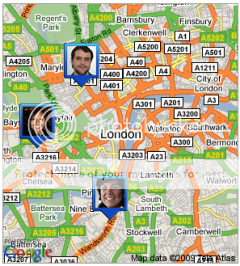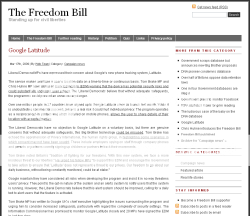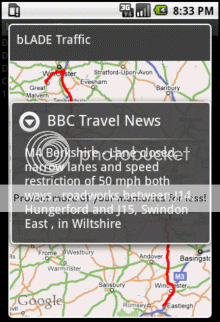I wrote a quick post on Sunday morning about the mobile location sharing hack I wrote at Open Hack London. My post tried to explain the tech behind it, but I wanted to follow it up with a post to explain my thinking around the social innovation in the idea.
Sharing your location with your friends. People have been talking about this for ages, but recently it’s started to hit the mainstream.
More and more mobile phones are coming with GPS. For the ones that don’t, systems like Skyhook and Google Maps for Mobile are getting smarter at using GSM Cell IDs and WiFi access point addresses to work out where you are.
 The reaction to this stuff finally arriving for the masses hasn’t all been positive, though. The response to the UK launch of Google Latitude – Google’s mobile application for sharing your location with friends from your Google contact list – is a good example.
The reaction to this stuff finally arriving for the masses hasn’t all been positive, though. The response to the UK launch of Google Latitude – Google’s mobile application for sharing your location with friends from your Google contact list – is a good example.
A threat to privacy?
Privacy International said that “…Google has created an unnecessary danger to the privacy and security of users…”. They argued that it was too easy for Latitude to be “…enabled by a second party without a user’s knowledge or consent…” and that once enabled it could remain undetected for a long time, with massive potential for abuse.
 Liberal Democrat MPs Tom Brake and my local MP Chris Huhne submitted an Early Day Motion to Parliament arguing that Latitude “…could substantially endanger user privacy…” and that “…Google has created an unnecessary danger to user privacy…”.
Liberal Democrat MPs Tom Brake and my local MP Chris Huhne submitted an Early Day Motion to Parliament arguing that Latitude “…could substantially endanger user privacy…” and that “…Google has created an unnecessary danger to user privacy…”.
Tom Brake followed this up with the now widely reported quote that “Google Latitude poses an insidious threat to our hard-won liberties“.
I personally think this was unnecessarily alarmist, but at any rate, it is clear that the model of granting ongoing access to your location (until / unless you revoke it) worries some people.
(more…)
 I wrote this week about
I wrote this week about 


